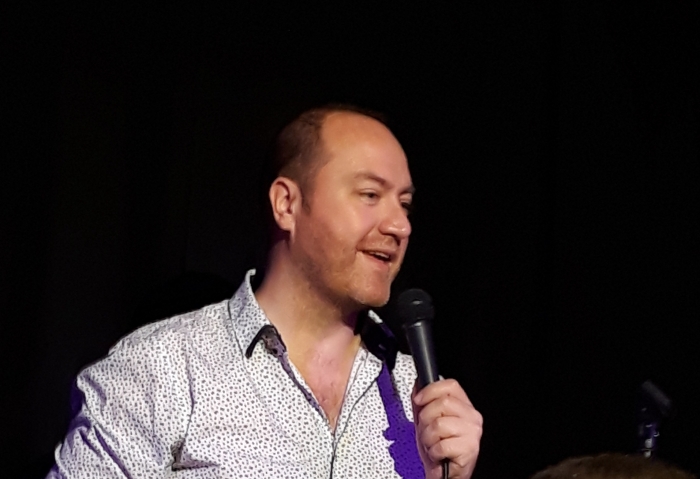
Just the Tonic at The Tron
Aug 1-25 (14:20)
Material:  Delivery:
Delivery: 
Laughs:  Room:
Room:
The cavalcade of comedians at the Edinburgh Fringe could be forgiven for being a little exhausted as they approached its final days. But having said this, Darius Davies’ Persian of Interest was immediately reassuring, and brilliantly funny. Bombastic, self-deprecating and politically incisive, he was a delight to watch in the intimacy of the Tonic at the Tron. As he took to the stage for his Thursday show, he began by ribbing sections of the audience for their less than enthusiastic applause. Promising a fantastic show – which he certainly delivered – Davies quickly won over these pockets of the audience in no time with an assortment of observational humour and clever social and political analysis.
A major theme of Persian of Interest focused on the increasingly unreliable nature of traditional and online media as a source of reliable information. The opening of his show helped emphasise this, with a prescient, menacing video montage illustrating the United Kingdom and the United States’ lurch towards right-wing nationalism, with snippets of Trump’s inauguration and Brexit. Davies’ montage also cleverly merged these developments with the parallel rise of app-based technologies and the ever increasing reliance on social media to both shape and define our lives. However, on a more ominous level, he highlighted how the use of increasingly sophisticated technology enabled unverified anecdotes and stories to spread quickly and aggressively across the internet without even the feeblest attempts to substantiate it. On a personal level, Davies illustrated the world’s struggle in combating fake news through his recollection of the time he had to throw a 12-pack of heckling Spanish tourists out of one of his shows during the 2017 Fringe, and the scornful, yet hilarious lengths they employed to get back at him on social media through a series of blatantly ridiculous accusations. By showcasing their efforts to the audience, Davies effectively demonstrated how platforms such as Twitter have become as much a reactionary, abusive battering ram against people in the public eye as they are a considered platform for qualified, considered opinion.

He went on to talk about his struggles with Tinder, and how, after experimenting with creating and using a female Tinder profile, he came to sympathise with women who use the app and the torrent of groin-based photography Tinder introduces them to. It’s a definite highlight of the show, but more pertinently, I felt it underlined the nuances of Davies’ act, and his mixture of a kind of virile, masculine stage persona with moments of well-delivered, subtle progressivism. From his commentaries on social media, it developed into a wider critique of the use of social media by news organisations, and the troubling lack of accuracy and substantiation that goes into elements of their journalism. In possibly the best part of his entire show, Davies enveloped the audience in his tale of how he got revenge on Ryanair’s weighty booking fees through the use of social media, an entertaining vendetta which eventually led to him being welcomed onto BBC News as an unverified witness to a news item he had zero relation to. The majesty of this story lies in its depiction of Davies’ transformation from an aggrieved Ryanair passenger to a morsel of woefully unsubstantiated media fodder on live news, and one accomplished in riveting detail. Furthermore, it provided a prescient take on the vacuity of established, modern-day news institutions, and their struggle to marry the rigours of traditional journalism with an increasing demand to involve their stories in fast-paced, scatty social media reactions and opinions. In a comic tale for the Trump era, Davies elegantly underlined these weaknesses in the modern newsroom to brilliant effect.
An audience’s patience for social and political commentaries within stand-up can often deteriorate quickly, so it’s a real testament to Davies’ act that he was able to skilfully weave funny, observational anecdotes into more serious contemplations regarding the news and modern technology in such an engaging way. I also appreciated how Davies was open to ribbing himself on occasion, such as when he presented a cringe-worthy video of his younger, shirtless self performing a wrestling promo to camera, or in moments when he mocked himself for perhaps being a little too conspiratorial about modern technology. In his fine balance between self-deprecation, accessibility and socio-political exposition, instances like this made his more serious takes on the news and modern technology all the more effective. For the majority of the show, I was really engrossed by Davies’ material and delivery. However, at times I found the use of sound effects slightly jarring, and some of his examples of media malpractice were a little too indefinite to be overly effective. But for a show that tackles both the complexities around the increasing role of technology in our lives and relying on traditional news as a source of information, it makes sense to provide a video element to the show, and for the most part, it works really well. Overall, I thought it was a considered and very funny take on grappling with trying to find truth in a news culture saturated with hyperbolic, and often unsubstantiated spectacle, a light-hearted comic treatment for the fake news era, and I look forward to seeing more of Davies’ work in the future.
James Nixon















 The Cave at Cabaret Voltaire looked attractive as we took our seats and slowly filled the room. It’s one those venues where the brickwork was exposed, a perfect setting for Australian Jez Watts’ brand of raw, close to the bone stand up. He revelled in his reputation for being “dirty”, verging on unacceptable and further reminded us that while we were there for comedy, he was at work, something he did with confidence. As he got into his stride, he confided that the title of his show, absolute zero, wasn’t because he was at rock bottom but was more to do with his state of indebtedness to his girlfriend, someone he revealed that he was going to propose to just as soon as he’s raised the money to pay her back. His prospective wife had in fact supplied the $1000 to furnish his act with the tech he used in his show,but he owed her a further $16000.
The Cave at Cabaret Voltaire looked attractive as we took our seats and slowly filled the room. It’s one those venues where the brickwork was exposed, a perfect setting for Australian Jez Watts’ brand of raw, close to the bone stand up. He revelled in his reputation for being “dirty”, verging on unacceptable and further reminded us that while we were there for comedy, he was at work, something he did with confidence. As he got into his stride, he confided that the title of his show, absolute zero, wasn’t because he was at rock bottom but was more to do with his state of indebtedness to his girlfriend, someone he revealed that he was going to propose to just as soon as he’s raised the money to pay her back. His prospective wife had in fact supplied the $1000 to furnish his act with the tech he used in his show,but he owed her a further $16000.









